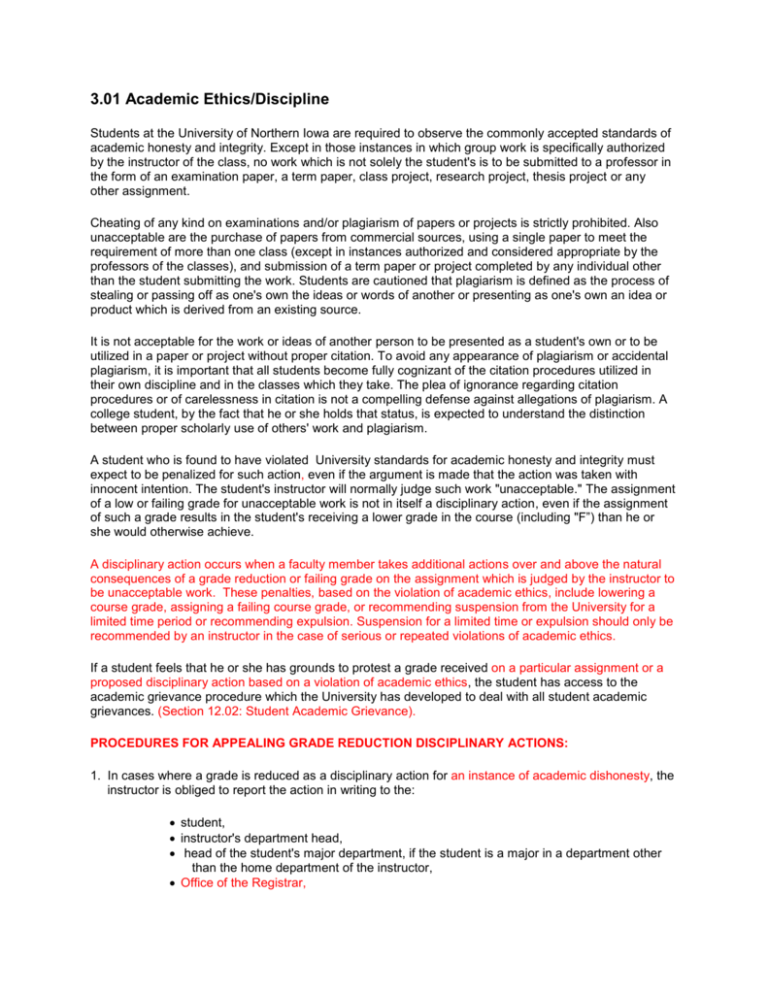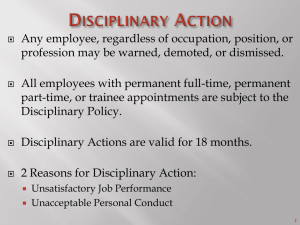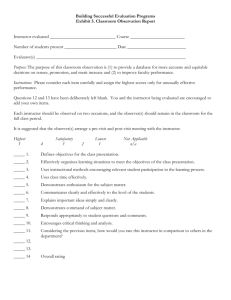Revision-3.01 Academic Ethics
advertisement

3.01 Academic Ethics/Discipline Students at the University of Northern Iowa are required to observe the commonly accepted standards of academic honesty and integrity. Except in those instances in which group work is specifically authorized by the instructor of the class, no work which is not solely the student's is to be submitted to a professor in the form of an examination paper, a term paper, class project, research project, thesis project or any other assignment. Cheating of any kind on examinations and/or plagiarism of papers or projects is strictly prohibited. Also unacceptable are the purchase of papers from commercial sources, using a single paper to meet the requirement of more than one class (except in instances authorized and considered appropriate by the professors of the classes), and submission of a term paper or project completed by any individual other than the student submitting the work. Students are cautioned that plagiarism is defined as the process of stealing or passing off as one's own the ideas or words of another or presenting as one's own an idea or product which is derived from an existing source. It is not acceptable for the work or ideas of another person to be presented as a student's own or to be utilized in a paper or project without proper citation. To avoid any appearance of plagiarism or accidental plagiarism, it is important that all students become fully cognizant of the citation procedures utilized in their own discipline and in the classes which they take. The plea of ignorance regarding citation procedures or of carelessness in citation is not a compelling defense against allegations of plagiarism. A college student, by the fact that he or she holds that status, is expected to understand the distinction between proper scholarly use of others' work and plagiarism. A student who is found to have violated University standards for academic honesty and integrity must expect to be penalized for such action, even if the argument is made that the action was taken with innocent intention. The student's instructor will normally judge such work "unacceptable." The assignment of a low or failing grade for unacceptable work is not in itself a disciplinary action, even if the assignment of such a grade results in the student's receiving a lower grade in the course (including "F”) than he or she would otherwise achieve. A disciplinary action occurs when a faculty member takes additional actions over and above the natural consequences of a grade reduction or failing grade on the assignment which is judged by the instructor to be unacceptable work. These penalties, based on the violation of academic ethics, include lowering a course grade, assigning a failing course grade, or recommending suspension from the University for a limited time period or recommending expulsion. Suspension for a limited time or expulsion should only be recommended by an instructor in the case of serious or repeated violations of academic ethics. If a student feels that he or she has grounds to protest a grade received on a particular assignment or a proposed disciplinary action based on a violation of academic ethics, the student has access to the academic grievance procedure which the University has developed to deal with all student academic grievances. (Section 12.02: Student Academic Grievance). PROCEDURES FOR APPEALING GRADE REDUCTION DISCIPLINARY ACTIONS: 1. In cases where a grade is reduced as a disciplinary action for an instance of academic dishonesty, the instructor is obliged to report the action in writing to the: student, instructor's department head, head of the student's major department, if the student is a major in a department other than the home department of the instructor, Office of the Registrar, Office of the Executive Vice President and Provost. 2. The Executive Vice President and Provost will maintain a file for each student so disciplined. This file is confidential and is independent of the student's normal University records. A student may not withdraw from the course after he/she has been notified by the instructor of the disciplinary action. 3. A student wishing to appeal or dispute the disciplinary action taken may seek redress through the University academic grievance structure. (Section 12.02: Student Academic Grievance). 4. In the case of a successful grievance, the evidence of the disciplinary action taken by the instructor will be expunged from the student's file by the Executive Vice President and Provost and the Registrar may process any request by the student to withdraw from the class. PROCEDURES FOR APPEALING A SUSPENSION OR EXPULSION RECOMMENDATION: In cases where an instructor recommends suspension or expulsion from the University the instructor is obliged to report the action in writing to the: student, instructor's department head, head of the student's major department, if the student is a major in a department other than the home department of the instructor, Office of the Registrar, Office of the Executive Vice President and Provost. Committee on Admission and Retention (?) 2. If an instructor has made a recommendation for suspension or expulsion, the Executive Vice President and Provost will notify the student in writing that such a recommendation has been made and that the formal academic appeals procedure is being automatically invoked beginning with Step C, the Student Academic Appeals Board (12.01.C). Until the mandatory academic appeal in such cases has been completed, the recommended suspension is not in effect. The Student Academic Appeals Board may reduce the penalty recommended by the instructor or it may find that no academic misconduct has occurred. In the event of a finding of no academic misconduct by the Appeals Board, the matter will be expunged from all University records. MONITORING AND PERMANENT SUSPENSION The Executive Vice President and Provost will regularly monitor all files on disciplinary action taken for academic misconduct against specific students. If the monitoring reveals record of three [or more] instances of academic misconduct disciplinary actions taken against a particular student (excluding any actions which have been successfully grieved) the Executive Vice President and Provost will institute proceedings for permanent suspension of that student. The Executive Vice President and Provost will make written notification to the student and the Chair of the appropriate Student Academic Appeal Board that suspension procedures are being invoked. The student has an automatic appeal using the University academic grievance procedure. All parts of the academic grievance structure (including those stipulated in the immediately preceding paragraph) apply in such cases, except that the Executive Vice President and Provost, as the disciplinary officer, functions in the role of the instructor in an academic grievance relating to a specific class. [Is there any reason not to use the same procedure as in 2. In Suspension procedures above?





